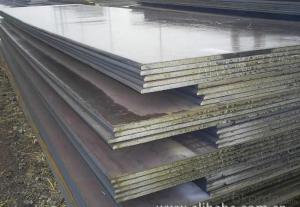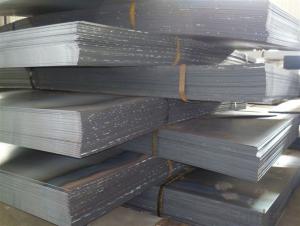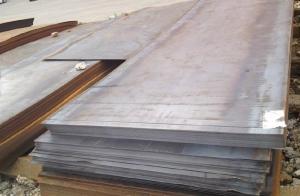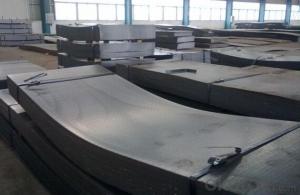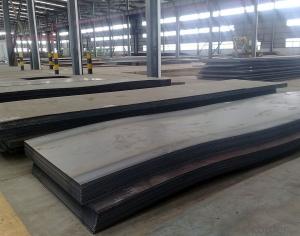5CrNiMoV Cold Rolled Steel Plate Different Types of Steel Sheet
- Loading Port:
- Tianjin
- Payment Terms:
- TT or LC
- Min Order Qty:
- 25 m.t.
- Supply Capability:
- 100000 m.t./month
OKorder Service Pledge
OKorder Financial Service
You Might Also Like
Item specifice
5CrNiMoV Cold Rolled Steel Sheet Prices Different Types of Steel Plate
| C | Si | P | S | yield Strength MAp | Tensile strength MAp | Elongation % | |
A36 | 0.24 | 0.4 | 0.045 | 0.03 | 250 | 400-520 | 26 | |
| C | Si | Mn | P | S | Cu |
|
|
A283 | ≤0.27 | 0.15-0.4 | ≤0.9 | ≤0.035 | ≤0.04 | ≥0.2 |
|
|
Thickness: | 6mm, 8mm, 12mm, 16mm, 20mm, 25mm, 30mm, 50mm, 80mm, 100mm, 150mm, 200mm | |||||||
Width: | 1500mm, 1800mm, 2000mm, 2200mm, 2500mm | |||||||
Length: | 6000mm, 8000m, can cut to width and length | |||||||
Packing: | according to customer‘s require or export’s standard | |||||||
Delivery time: | 7 days for stock sizes, 20-25 days for new production sizes | |||||||
Related Products Overviews
Product Name | Typical Grades | Diameter(mm) | Standard Adopted |
Carbon Steel | 20 (1020/S20C/C22) |
Ø16-Ø300 |
GB/SAE/ JIS/DIN |
40 (1040/S40C/C40) | |||
45 (1045/S45C/C45) | |||
Bearing Steel | GCr9 (51100/SUJ1) |
Ø12-Ø250 | |
GCr15 (52100/SUJ2/100Gr6) | |||
GCr9SiMn (A485-Gr.1/SUJ3) | |||
Cr-Mo Steel | 20Cr (5120/SCr420H/20Cr4) |
Ø12-Ø250 | |
40Cr (5140/SCr440/41Cr4) | |||
42CrMo(4140/SCM440/42CrMo4) | |||
Gear Steel | 20CrNiMo |
Ø16-Ø600 | |
20CrMn(5115/SMnC420/20MnCr5) | |||
20CrNiMo(8620/SNCM220/20CrMiMo2) |
CNBM International are mainly concentrate on Cement, Glass, Iron and Steel, Ceramics industries and devotes herself for supplying high quality series of refractories as well as technical consultancies and logistics solution.
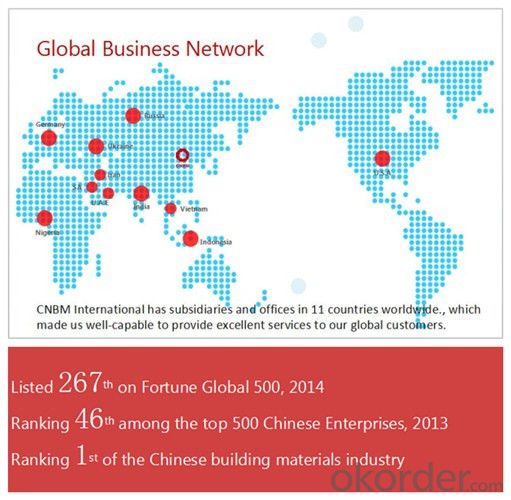
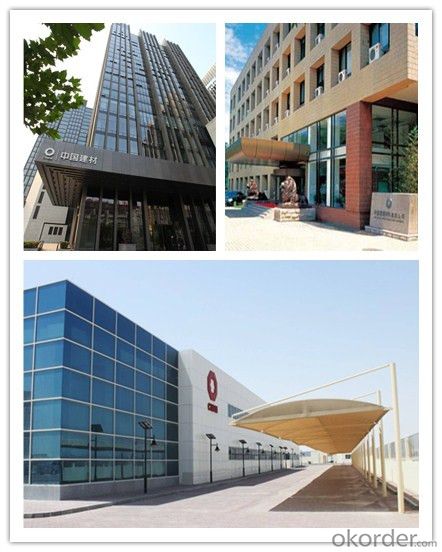
After-sale service | 1. CNBM provides the services and support you need for every step of our cooperation. We’re the business partners you can trust; you can relax and get on with doing business. 2. For any problem, please kindly contact us at any your convenient time, we’ll reply you in our first priority within 24 hours |
Advantages
| 1. Industry experience over 20 years. 2. Shipment of goods -More than 70 countries worldwide. 3. The most convenient transport and prompt delivery. 4. Competitive price with best service. 5. High technical production line with top quality products. 6. High reputation based on best quality products. |
| Packaging | Sea worthy packing /as per customer's packing instruction |
| Delivery | 15 ~ 40 days after receiving the deposit |
- Q:Are there any disadvantages of using special steel?
- There are several disadvantages associated with the use of special steel. To begin with, special steel tends to be more expensive compared to regular steel. This is primarily due to the additional alloying elements and heat treatments involved in its production, which contribute to the higher cost. As a result, it may not be the most cost-effective option for applications where cost is a major factor. Furthermore, special steel may have limited availability in comparison to regular steel. It is often produced in smaller quantities and may only be obtainable from specific suppliers. This can lead to longer lead times and difficulties in sourcing the required amount of special steel, particularly for large-scale projects. Additionally, the increased complexity of working with special steel can pose challenges. It may require specialized knowledge, skills, and equipment for handling and processing. If the necessary expertise or resources are not readily available, this can result in higher manufacturing costs and potential delays in production. Moreover, some special steel grades with high strength and hardness can be more prone to brittleness. This means they may be susceptible to cracking or breaking under certain conditions, especially when exposed to extreme temperatures or sudden impact loads. This limitation can be a disadvantage in applications that require high toughness or resistance to fracture. Lastly, special steel may have limited applications due to its specific properties. While it offers advantages such as corrosion resistance, high temperature resistance, or improved mechanical properties, these benefits may not be relevant or necessary for every application. Consequently, using special steel in such cases may incur unnecessary expenses without any tangible benefits. In conclusion, special steel has its drawbacks, including higher costs, limited availability, increased complexity, potential brittleness, and limited applicability. Therefore, it is crucial to carefully consider the specific requirements of a project before opting for special steel.
- Q:How is special steel used in the production of cutting inserts?
- The unique properties of special steel make it the ideal choice for producing cutting inserts. Cutting inserts are utilized in machining operations to shape and remove material from a workpiece. These inserts must possess the ability to endure high temperatures, resist wear and abrasion, and maintain their sharp cutting edges for extended periods. Commonly referred to as tool steel, special steel is specifically engineered to meet these requirements. It is an alloy that incorporates a variety of elements like chromium, tungsten, vanadium, and molybdenum, which enhance its mechanical properties. With its exceptional hardness, toughness, and resistance to high temperatures, special steel is a suitable material for cutting inserts. To further augment its properties, the special steel employed in manufacturing cutting inserts undergoes a series of processes, including heat treatment. This process involves subjecting the steel to specific temperatures and rapidly cooling it, resulting in increased strength and hardness. By undergoing heat treatment, the cutting inserts become capable of withstanding the extreme forces and temperatures encountered during machining operations. Moreover, special steel can be coated with materials like titanium nitride or diamond-like carbon to enhance its performance. These coatings contribute to the hardness, friction reduction, and overall wear resistance of the cutting inserts, ultimately extending their lifespan and improving efficiency. In conclusion, special steel is selected for the production of cutting inserts due to its remarkable hardness, toughness, high-temperature resistance, and wear resistance. These properties enable the cutting inserts to withstand the demanding conditions of machining operations and retain their sharp cutting edges for prolonged periods. As a result, material removal is carried out efficiently and precisely.
- Q:Can special steel be used for food processing equipment?
- Yes, special steel can be used for food processing equipment. Special steel, such as stainless steel, is often preferred in the food industry due to its hygienic properties, resistance to corrosion, and durability. It is commonly used in various food processing equipment such as mixers, slicers, cutters, and storage tanks to ensure safe and efficient food production.
- Q:What are the different forging techniques used for special steel?
- Some of the different forging techniques used for special steel include open die forging, closed die forging, and ring rolling.
- Q:What are the properties of high-strength steel?
- High-strength steel possesses exceptional mechanical properties such as high tensile strength, toughness, and resistance to deformation. It also exhibits excellent corrosion resistance, which makes it suitable for various heavy-duty applications. Additionally, high-strength steel offers lower weight compared to conventional steel, enabling the design of lighter and more fuel-efficient structures.
- Q:Is the steel column of the steel structure HM a special steel?
- The mid flange H section steel HM (M for Middle English prefix) in GB/T 112631998 this standard inside, not special steel;
- Q:What are the different powder coating techniques used for special steel?
- There are several powder coating techniques used for special steel, including electrostatic spray, fluidized bed, and flame spraying. Each technique offers unique advantages and is chosen based on factors such as the desired coating thickness, complexity of the surface, and specific properties required for the steel's functionality.
- Q:Can special steel be used in the defense industry?
- Yes, special steel can be used in the defense industry. Special steel alloys, such as armor-grade steel or stainless steel, possess unique properties that make them suitable for various defense applications. These steels offer enhanced strength, durability, and resistance to corrosion and high temperatures, making them ideal for manufacturing military vehicles, aircraft, naval vessels, and ballistic protection systems. Additionally, special steel can also be used in the production of weaponry, including firearms, missiles, and armored vehicles, due to its ability to withstand extreme conditions and provide superior performance in combat situations.
- Q:Can special steel be used in the pharmaceutical manufacturing equipment manufacturing industry?
- Yes, special steel can be used in the pharmaceutical manufacturing equipment manufacturing industry. Special steel offers several advantages such as resistance to corrosion, high strength, and durability, making it suitable for various applications in pharmaceutical manufacturing equipment. It ensures the hygienic and safe production of pharmaceutical products, meeting the industry's specific requirements and regulations. Additionally, special steel's ability to withstand extreme temperatures and harsh chemicals makes it a valuable material for manufacturing equipment used in pharmaceutical processes.
- Q:What is the impact of carburizing on the properties of special steel?
- Carburizing has a significant impact on the properties of special steel. It improves the surface hardness and wear resistance of the steel by introducing carbon into its surface layer. This process creates a hardened case while maintaining a tough core, enhancing the steel's overall strength and durability. Additionally, carburizing enhances the steel's ability to withstand high temperatures and increases its resistance to corrosion. Overall, carburizing plays a crucial role in enhancing the mechanical properties of special steel, making it suitable for various applications in industries such as automotive, aerospace, and manufacturing.
1. Manufacturer Overview |
|
|---|---|
| Location | |
| Year Established | |
| Annual Output Value | |
| Main Markets | |
| Company Certifications | |
2. Manufacturer Certificates |
|
|---|---|
| a) Certification Name | |
| Range | |
| Reference | |
| Validity Period | |
3. Manufacturer Capability |
|
|---|---|
| a)Trade Capacity | |
| Nearest Port | |
| Export Percentage | |
| No.of Employees in Trade Department | |
| Language Spoken: | |
| b)Factory Information | |
| Factory Size: | |
| No. of Production Lines | |
| Contract Manufacturing | |
| Product Price Range | |
Send your message to us
5CrNiMoV Cold Rolled Steel Plate Different Types of Steel Sheet
- Loading Port:
- Tianjin
- Payment Terms:
- TT or LC
- Min Order Qty:
- 25 m.t.
- Supply Capability:
- 100000 m.t./month
OKorder Service Pledge
OKorder Financial Service
Similar products
New products
Hot products
Related keywords
